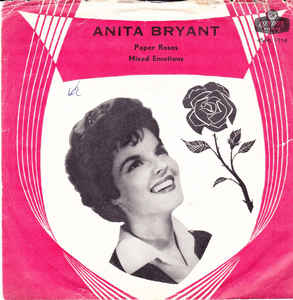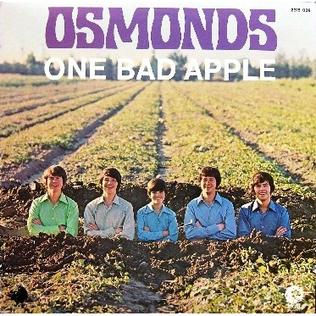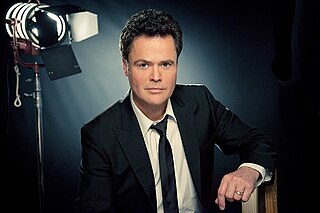"Mountain of Love" is a song written by Harold Dorman. Dorman released his version as a single in 1960. It was originally recorded in late 1959 at the Royal Recording Studios in Memphis before the backing vocals were overdubbed. It performed well, spending 19 weeks on the Billboard Hot 100 chart, peaking at No. 21 in May 1960, while reaching No. 7 on the Billboard Hot R&B Sides chart, and No. 25 on Canada's "CHUM Hit Parade". The song was his only top forty hit on the Billboard Hot 100 and was the highest-charting single of his career.
"Why" is a hit song recorded by Frankie Avalon in 1959. It reached No. 1 on the U.S. Billboard Hot 100 chart published on the week of December 28, 1959. It was Avalon's second and final No. 1 hit.
"Young Love" is a popular song, written by Ric Cartey and Carole Joyner, and published in 1956. The original version was recorded by Ric Cartey with the Jiva-Tones on November 24, 1956. Joyner was a high school student when she co-wrote the song with Cartey, her boyfriend at the time. It was released in 1956 by Stars Records as catalog number 539 and one month later by RCA Records as catalog number 47-6751. Cartey's version never charted.
Kenneth "Kenny" Nolan is an American singer-songwriter from Los Angeles.

"Bo Diddley" is a song by American rock and roll pioneer Bo Diddley. It introduced the rhythm that became known as the Bo Diddley beat and topped the Billboard R&B chart for two weeks in 1955. The song is included on many of Diddley's compilation albums including Bo Diddley (1958) and His Best (1997). Buddy Holly recorded a version that became his highest-charting single in the UK.

"Go Away Little Girl" is a popular song written by Gerry Goffin and Carole King. It was first recorded by Bobby Vee for Liberty Records on March 28, 1962. The lyrics consist of a young man asking a young attractive woman to stay away from him, so that he will not be tempted to betray his steady girlfriend by kissing her. The song is notable for making the American Top 20 three times: for Steve Lawrence in 1963, for The Happenings in 1966, and for Donny Osmond in 1971. It is also the first song, and one of only nine, to reach US number 1 by two different artists. Also notable in each of the solo versions is the similar double-tracked treatment of the singer's voice.

"Paper Roses" is a popular song written and composed by Fred Spielman and Janice Torre. It first was a top five hit in 1960 for Anita Bryant. Marie Osmond recorded it in 1973 and took her version to number one on the US country chart.

"One Bad Apple" is a song by the Osmonds, released as a single on November 14, 1970. It debuted on the Billboard Hot 100 on January 2, 1971. It hit the top of the chart on February 13, 1971 and stayed there for five weeks. It also reached No. 6 on the R&B chart. Billboard ranked it as the No. 4 song for 1971. The song is an early example of bubblegum dance. Both "One Bad Apple" and the Donny Osmond-credited single "Sweet and Innocent" are on the 1970 album Osmonds. It was certified Gold by the RIAA on February 4, 1971.

"C'mon Marianne" is a song composed by L. Russell Brown and Raymond Bloodworth and popularized by The Four Seasons in 1967. Produced by Bob Crewe, the single was the last Four Seasons single to reach the Top Ten of the Billboard Hot 100 chart in the 1960s, and their last Top Ten hit until "Who Loves You" in 1975.

"(You're My) Soul and Inspiration" is a song by American pop duo the Righteous Brothers. It was the group's first hit after leaving their long-time producer Phil Spector. The song was written by Barry Mann and Cynthia Weil, who also wrote the group's first hit "You've Lost That Lovin' Feelin'" along with Phil Spector. It is the title track of their album. The single peaked at No. 1 on the US Billboard Hot 100, and reached No. 15 on the UK Singles Chart. Billboard ranked the record as the No. 3 single for 1966.

"Hey Girl" is a song written and composed by Gerry Goffin and Carole King. It first became a popular Top ten hit on the Billboard Hot 100 in August 1963 when recorded by Freddie Scott. Donny Osmond took the song back to the Billboard top ten chart with his cover in 1971. Billy Joel recorded a version of the song for his 1997 album Greatest Hits Volume III.

"Sweet and Innocent" is a song written by Rick Hall and Billy Sherrill, first recorded by Roy Orbison in 1958. It was released as the B-side to the single, "Seems to Me".

Paper Roses is a studio album by American singer Marie Osmond. It was released in September 1973 in conjunction with MGM Records and Kolob Records. Paper Roses was the debut studio album in Osmond's career and its title track was released as her debut single. The song topped the US and Canadian country charts. It also crossed over onto both the US, Canadian and UK pop charts upon its release. The album itself also topped the US country charts, while also reaching chart positions in Canada and the United Kingdom. An additional nine tracks were included on the album, many of which were covers of previously recorded country songs.

The discography of American pop singer Donny Osmond contains 18 studio albums, nine compilation albums, one live album, four video albums, three extended plays, four music videos, 25 singles and eight additional appearances. After several years collaborating with his siblings' band, The Osmonds, he embarked on a solo career in 1971. His debut single, "Sweet and Innocent," reached number seven on the Billboard Hot 100 and made him a teen pop star. Its follow-up entitled "Go Away Little Girl" topped the same chart in 1971. Also in 1971 his debut studio album was released called The Donny Osmond Album. It peaked at number 13 on the Billboard 200 all-genre chart. His third studio release, Portrait of Donny, reached number six on the Billboard 200 and is his highest-charting album to date. Its two singles became top ten hits on the pop chart: "Hey Girl" and "Puppy Love." He released his fourth studio effort in 1972, Too Young. The record peaked at number 11 on the Billboard 200. It spawned the top 20 pop hits: the title track and "Why." In 1973, Alone Together marked his fifth studio album release and peaked at number 26 in the United States. It spawned his cover of "The Twelfth of Never," which reached number eight on the Hot 100. By the mid-1970s, Osmond reached adulthood and his career began to decline despite collaborations with his sister, Marie Osmond. In 1976, he recorded an album of disco, which only reached number 145 on the Billboard 200.
"You've Never Been This Far Before" is a song written and recorded by American country music artist Conway Twitty. It was released in July 1973 as the second single and title track from the album You've Never Been This Far Before.
"Dream On" is a song written by Dennis Lambert and Brian Potter. In 1974, The Righteous Brothers had a hit version, reaching No. 32 on the Billboard Hot 100, and No. 6 on the U.S. and Canadian Adult Contemporary charts. Bill Medley and Bobby Hatfield alternate lead vocals.
"Lay a Little Lovin' on Me" is a 1970 song written by Jeff Barry, Robin McNamara, and Jim Cretecos and recorded by Robin McNamara. The song reached number 11 on the Billboard Hot 100, and was McNamara's only hit. "Lay A Little Lovin' On Me" also peaked at number 6 on Canada's national RPM Top 100 singles chart in August 1970, and at number 49 in Australia in 1970. It wasn't his only charting single in Canada - the follow-up single, "Got To Believe In Love", reached number 62.

"Let Me In" is a song written by Alan Osmond, Merrill Osmond, and Wayne Osmond and performed by The Osmonds. It was featured on their 1973 album, The Plan. The song was produced by Alan Osmond.

The discography of American pop duo Donny and Marie Osmond contains seven studio albums, four compilation albums, one soundtrack album, one live album and 12 singles. Both siblings had previously had successful solo music careers before first collaborating in 1974; Donny was also a member of his brothers' band, The Osmonds. Their first single, "I'm Leaving It Up to You," reached number four on the Billboard Hot 100. Their corresponding debut album of the same name peaked at number 35 on the Billboard 200 chart in November 1974. The release certified gold in the United States for sales beyond 500,000 copies. Together, the duo had two more hits that reached both the top ten and 20 of the Hot 100: "Deep Purple" and "Morning Side of the Mountain."
Little Walter (1930–1968) was an American blues artist who is generally regarded as the most influential blues harmonica player of his era. Most of his earliest recordings were as a sideman, when he contributed harmonica to songs by Chicago blues musicians such as Jimmy Rogers and Muddy Waters. As the featured artist, he recorded the instrumental "Juke" in 1952. The single reached number one on the Billboard Rhythm and Blues chart and launched his career as a solo artist.












